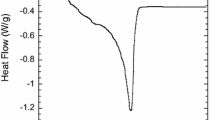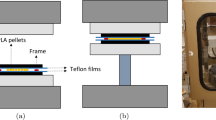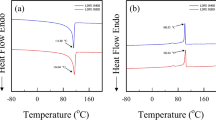Abstract
This paper investigates the uniaxial compressive failure behavior of polymethacrylimide (PMI) foam across a range of temperatures (20 °C–200 °C), at both macro- and microscales. The investigation includes dynamic mechanical analysis and dimensional stability tests to evaluate the material’s heat resistance. The stress–strain curve of PMI foam under varying compressive failure mechanisms was analyzed, utilizing the Liu–Subhash model for accurate prediction of the material’s stress–strain constitutive relationship at different temperatures. The results indicate that between 20 °C and 180 °C, PMI foam behaves as an elastoplastic material, displaying a “three-stage” pattern in its stress–strain curve. At 200 °C, the material transitions to a hyperelastic incompressible state, evidenced by a “two-stage” stress–strain pattern. The paper also determines how temperature affects yield strength and elastic modulus, as well as the influence of strain rate at different temperatures. A quasi-static compression constitutive model for PMI foam, considering temperature effects, was modified from the Liu–Subhash model. These findings offer crucial theoretical support and data for understanding the thermo-mechanical bearing mechanism in composite sandwich structures.


















Similar content being viewed by others
References
Arezoo, L., Tagarielli, V.L., Sivour, C.R., et al.: Compressive deformation of Rohacell foams: effects of strain rate and temperature. Int. J. Impact Eng. 51, 50–57 (2012). https://doi.org/10.1016/j.ijimpeng.2012.07.010
Bhat, T., Kandare, E., Gibson, A.G., et al.: Compressive softening and failure of basalt fibre composites in fire: modeling and experimentation. Compos. Struct. 165, 15–24 (2017). https://doi.org/10.1016/j.compstruct.2017.01.003
Chen, X.-Q., Zhang, M., Lei, Y.: Preparation and compression properties of PMI foam. Eng. Plast. Appl. 39(06), 60–63
Dia, W.-P., Li, W.-X.: High-temperature compressive creep performance of PMI foams. Fiber Reinf. Plast. Compos. 249(11), 82–87 (2014)
Dong, Y.-T., Chen, W.-W.: The overview of the preparation and flame retardant modification of ploymethacrylimide foam. China Plast. Ind. 48(12), 1–6 (2020)
GB/T8811-2008: Rigid cellular plastics-test method for dimensional stability Standard China
GB/T8813-2020: Rigid cellular plastics-determination of compression properties Standard China
GJB 1585A-2004: Test method for mechanical properties of rigid cellular polyurethane plastics Standard China
Hu, S.-S., Liu, J.-F., Wang, W.: Study of the constitutive relationship of rigid polyurethane foam. Acta Mater. Compos. Sin. 30(2), 151–156 (1998)
Hwang, J.-J., Adachi, T., Araki, W.: Time-temperature dependence of compressive behavior of polypropylene foams. Key Eng. Mater. 345–346, 153–156 (2007). https://doi.org/10.4028/www.scientific.net/KEM.345-346.153
Ihab, G., Pilipchuk, V., Ibrahim, R., et al.: Temperature effect on non-stationary compressive loading response of polymethacrylimide solid foam. Compos. Struct. 94, 3052–3063 (2012). https://doi.org/10.1016/j.compstruct.2012.04.022
Jeong, K.Y.: Constitutive modeling of polymeric foams having a four-parameter modulus function with strain rate sensitivity. J. Mech. Sci. Technol. 30(2), 683–688 (2016). https://doi.org/10.1007/s12206-016-0124-7
Jeong, K.Y., Cheon, S.S., Munshi, M.B.: A constitutive model for polyurethane foam with strain rate sensitivity. J. Mech. Sci. Technol. 26(7), 2033–2038 (2012). https://doi.org/10.1007/s12206-012-0509-1
Jia, Z., Tiantian, L., Chiang, F.-P., et al.: An experimental investigation of the temperature effect on the mechanics of carbon fiber reinforced polymer composites. Compos. Sci. Technol. 154, 53–63 (2018). https://doi.org/10.1016/j.compscitech.2017.11.015
Li, J.-Y., Wang, F.-Y., Wang, Y.-L., et al.: Quasi-static constitutive model of high density cellular silicon rubber. Mach. Tool Hydraul. 46(7), 26–30 (2018). https://doi.org/10.3969/j.issn.1001-3881.2018.07.007
Liu, Q., Subhash, G.: A phenomenological constitutive model for foams under large deformations. Polym. Eng. Sci. 44(3), 463–473 (2004). https://doi.org/10.1002/pen.20041
Mei, Z.-Y.: Characteristic analysis and prospect of applied engineering technology for composite structures of naval ships. Chin. J. Ship Res. 16(2), 1–8 (2021). (in Chinese)
Meng, H.-Y., Chen, B., Song, J., et al.: Compression failure life prediction and verification of polymethacrylimide foam. Acta Mater. Compos. Sin. 40(2), 1218–1228 (2023). https://doi.org/10.13801/j.cnki.fhclxb.20220314.003
Mi, X.-Y., Zhang, G.-C., Zhang, L., et al.: Heat resistance testing methods of rigid foam plastics. Eng. Plast. Appl. 40(8), 71–76 (2012). https://doi.org/10.3969/j.issn.1001-3539.2012.08.017
Palomba, G., Epasto, G., Crupi, V.: Lightweight sandwich structures for marine applications: a review. Mech. Adv. Mat. Struct. 29(26), 4839–4864 (2021). https://doi.org/10.1080/15376494.2021.1941448
Pietro, M., Firmo, J.P., Correia, J.R., et al.: Mechanical behaviour in shear and compression at elevated temperature of polyethylene terephthalate (PET) foam. J. Build. Eng. 51, 102526 (2021). https://doi.org/10.1016/j.jobe.2021.102526
Schwaber, D.M., Meinecke, E.A.: Energy absorption in polymeric foams. II. Prediction of impact behavior from instron data for foams with rate-dependent modulus. J. Appl. Polym. Sci. 15(10), 2381–2393 (1971). https://doi.org/10.1002/app.1971.070151006
Shao, C.-J., Xu, Y.-F., Yang, T.-S., et al.: Experimental study of mechanical properities of expanded polystyrene foam to uniaxial compression. Res. Explor. Lab. 4(11), 49–52 (2022)
Sherwood, J.A., Frost, C.C.: Constitutive modeling and simulation of energy absorbing polyurethane foam under impact loading. Polym. Eng. Sci. 32(16), 1138–1146 (1992). https://doi.org/10.1002/pen.760321611
Song, J., He, C., C, X., et al.: Experimental study on heat resistance property of PMI foam. Aeronaut. Manuf. Technol. 495(S2), 12–14+19 (2015)
Sorathia, U., Ness, J., Blum, M.: Fire safety of composites in the US Navy. Composites, Part A, Appl. Sci. Manuf. 30(5), 707–713 (1999). https://doi.org/10.1016/S1359-835X(98)00112-2
Wang, H.-N.: Constitutive Model for Composite Layered Structures with Paper Sandwich Core and Polyethylene Foam. Xi’an University of Technology, Xi’an (2019). (in Chinese)
Xi, H.-F., Liu, Y.-P., Tang, L.-Q., et al.: Constitutive model of aluminum foam with temperature effect under quasi-static compression. J. Harbin Eng. Univ. 34(8), 1000–1005 (2013). https://doi.org/10.3969/j.issn.1006-7043.20121102
Zhang, G.-D., Li, B., Hu, X.-Y.: Advances in low-cost preparation of polymethacrylimide foam. Thermoset. Resin 36(03), 62–68 (2021)
Zhao, X.-L., Jin, X., Ding, C.-C., et al.: Effect of heat treatment time on structure and properties of PMI foam. J. Mater. Eng. 48(3), 53–58 (2020)
Acknowledgements
The authors acknowledge support from the National Natural Science Foundation of China (51479205, 51609252).
Author information
Authors and Affiliations
Contributions
Chen is responsible for fitting theoretical formulas and experimental data, writing the content of Part 5 and compiling the entire manuscript; L is responsible for the second part of experimental testing and data processing, and writes the content of the second part; M is responsible for writing the content of Part 1, analyzing the content of Part 4, and designing the overall framework of the article; L is responsible for the data processing and plotting of the fourth part of the content; B is responsible for the experimental testing, data processing, and analysis of Part 3. All authors have reviewed the manuscript
Corresponding author
Ethics declarations
Competing interests
The authors declare no competing interests.
Additional information
Publisher’s Note
Springer Nature remains neutral with regard to jurisdictional claims in published maps and institutional affiliations.
Rights and permissions
Springer Nature or its licensor (e.g. a society or other partner) holds exclusive rights to this article under a publishing agreement with the author(s) or other rightsholder(s); author self-archiving of the accepted manuscript version of this article is solely governed by the terms of such publishing agreement and applicable law.
About this article
Cite this article
Chen, G., Lv, Y., Mei, Z. et al. Characterization and modeling of the uniaxial thermo-mechanical compressive behavior of polymethacrylimide (PMI) foam at different temperatures. Mech Time-Depend Mater (2024). https://doi.org/10.1007/s11043-024-09671-x
Received:
Accepted:
Published:
DOI: https://doi.org/10.1007/s11043-024-09671-x




